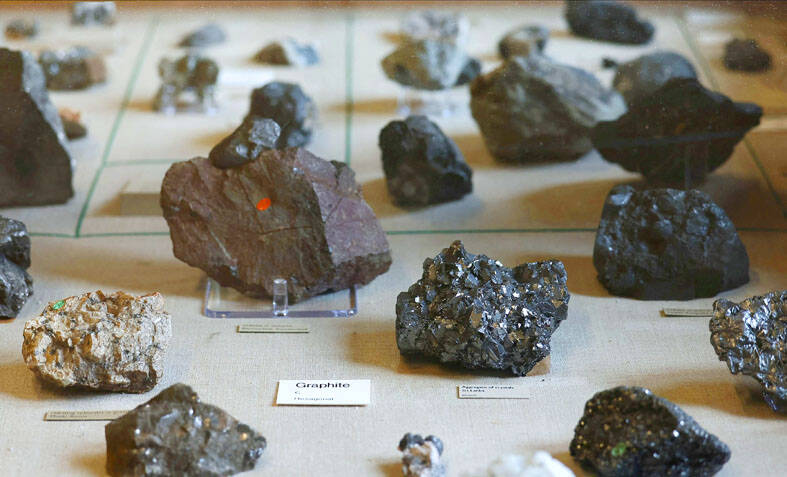The US on Thursday unveiled preliminary anti-dumping duties of 93.5 percent on imports of a key battery component from China, after looking into a petition on the matter.
Final determinations regarding duties on graphite are expected in early December, the US Department of Commerce said.
Its investigation came after a petition late last year by the American Active Anode Material Producers, an ad hoc coalition including US graphite producers.

Photo: Reuters
Graphite is an important raw material used in making anodes of batteries and China is a dominant player when it comes to its processing capacity of graphite.
The duty could raise temperatures in the global electric vehicle supply chain, potentially adding to costs for automakers who rely on the material for production.
The products covered under the investigation include active anode material, whether or not they are contained in finished batteries.
China and the US are now engaged in negotiations about their broader economic relationship after reaching a framework for a deal last month, stepping back from the brink of a spiraling trade war.
Asked about the new graphite duties, the Chinese Ministry of Foreign Affairs yesterday said that “the essence of China-US economic and trade cooperation is mutual benefit and win-win results.”
“It is hoped the US side will conscientiously abide by the rules of the market economy, and maintain the healthy and stable development of China-US economic and trade relations,” ministry spokesman Lin Jian (林劍) said.
The commerce department’s notice came as a group of US solar panel manufacturers on Thursday asked the US government to impose tariffs on imports from Indonesia, India and Laos, accusing companies there of dumping cheap goods on the market to undercut new US factories.
The Alliance for American Solar Manufacturing and Trade, which filed the petition, says Chinese-owned companies shifted production from nations that received US tariffs to Indonesia and Laos, and also accuses Indian-headquartered manufacturers of dumping cheap goods in the US.
Imports from the three nations combined were US$1.6 billion last year, up from US$289 million in 2022, the petitioners said.
The commerce department has 20 days to decide whether to initiate an investigation into whether to impose tariffs. Anti-dumping and countervailing trade cases typically take about a year to result in finalized tariffs.
The group has succeeded previously in winning tariffs on imports from nations in Southeast Asia, including Malaysia, Cambodia, Vietnam and Thailand. Those tariffs were finalized earlier this year.
Additional reporting by Reuters

On Ireland’s blustery western seaboard, researchers are gleefully flying giant kites — not for fun, but in the hope of generating renewable electricity and sparking a “revolution” in wind energy. “We use a kite to capture the wind and a generator at the bottom of it that captures the power,” said Padraic Doherty of Kitepower, the Dutch firm behind the venture. At its test site in operation since September 2023 near the small town of Bangor Erris, the team transports the vast 60-square-meter kite from a hangar across the lunar-like bogland to a generator. The kite is then attached by a

Foxconn Technology Co (鴻準精密), a metal casing supplier owned by Hon Hai Precision Industry Co (鴻海精密), yesterday announced plans to invest US$1 billion in the US over the next decade as part of its business transformation strategy. The Apple Inc supplier said in a statement that its board approved the investment on Thursday, as part of a transformation strategy focused on precision mold development, smart manufacturing, robotics and advanced automation. The strategy would have a strong emphasis on artificial intelligence (AI), the company added. The company said it aims to build a flexible, intelligent production ecosystem to boost competitiveness and sustainability. Foxconn

Leading Taiwanese bicycle brands Giant Manufacturing Co (巨大機械) and Merida Industry Co (美利達工業) on Sunday said that they have adopted measures to mitigate the impact of the tariff policies of US President Donald Trump’s administration. The US announced at the beginning of this month that it would impose a 20 percent tariff on imported goods made in Taiwan, effective on Thursday last week. The tariff would be added to other pre-existing most-favored-nation duties and industry-specific trade remedy levy, which would bring the overall tariff on Taiwan-made bicycles to between 25.5 percent and 31 percent. However, Giant did not seem too perturbed by the

TARIFF CONCERNS: Semiconductor suppliers are tempering expectations for the traditionally strong third quarter, citing US tariff uncertainty and a stronger NT dollar Several Taiwanese semiconductor suppliers are taking a cautious view of the third quarter — typically a peak season for the industry — citing uncertainty over US tariffs and the stronger New Taiwan dollar. Smartphone chip designer MediaTek Inc (聯發科技) said that customers accelerated orders in the first half of the year to avoid potential tariffs threatened by US President Donald Trump’s administration. As a result, it anticipates weaker-than-usual peak-season demand in the third quarter. The US tariff plan, announced on April 2, initially proposed a 32 percent duty on Taiwanese goods. Its implementation was postponed by 90 days to July 9, then